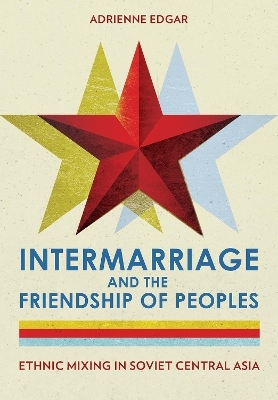
Intermarriage and the Friendship of Peoples
Ethnic Mixing in Soviet Central Asia
Seiten
2022
Cornell University Press (Verlag)
978-1-5017-6294-9 (ISBN)
Cornell University Press (Verlag)
978-1-5017-6294-9 (ISBN)
Co-winner of the Central Eurasian Studies Society's prize for best book in History and the Humanities in 2022 and 2023, and winner of the The Joseph Rothschild Prize in Nationalism and Ethnic Studies of the Association for the Study of Nationalities
Intermarriage and the Friendship of Peoples examines the racialization of identities and its impact on mixed couples and families in Soviet Central Asia. In marked contrast to its Cold War rivals, the Soviet Union celebrated mixed marriages among its diverse ethnic groups as a sign of the unbreakable friendship of peoples and the imminent emergence of a single "Soviet people." Yet the official Soviet view of ethnic nationality became increasingly primordial and even racialized in the USSR's final decades. In this context, Adrienne Edgar argues, mixed families and individuals found it impossible to transcend ethnicity, fully embrace their complex identities, and become simply "Soviet."
Looking back on their lives in the Soviet Union, ethnically mixed people often reported that the "official" nationality in their identity documents did not match their subjective feelings of identity, that they were unable to speak "their own" native language, and that their ambiguous physical appearance prevented them from claiming the nationality with which they most identified. In all these ways, mixed couples and families were acutely and painfully affected by the growth of ethnic primordialism and by the tensions between the national and supranational projects in the Soviet Union.
Intermarriage and the Friendship of Peoples is based on more than eighty in-depth oral history interviews with members of mixed families in Kazakhstan and Tajikistan, along with published and unpublished Soviet documents, scholarly and popular articles from the Soviet press, memoirs and films, and interviews with Soviet-era sociologists and ethnographers.
Intermarriage and the Friendship of Peoples examines the racialization of identities and its impact on mixed couples and families in Soviet Central Asia. In marked contrast to its Cold War rivals, the Soviet Union celebrated mixed marriages among its diverse ethnic groups as a sign of the unbreakable friendship of peoples and the imminent emergence of a single "Soviet people." Yet the official Soviet view of ethnic nationality became increasingly primordial and even racialized in the USSR's final decades. In this context, Adrienne Edgar argues, mixed families and individuals found it impossible to transcend ethnicity, fully embrace their complex identities, and become simply "Soviet."
Looking back on their lives in the Soviet Union, ethnically mixed people often reported that the "official" nationality in their identity documents did not match their subjective feelings of identity, that they were unable to speak "their own" native language, and that their ambiguous physical appearance prevented them from claiming the nationality with which they most identified. In all these ways, mixed couples and families were acutely and painfully affected by the growth of ethnic primordialism and by the tensions between the national and supranational projects in the Soviet Union.
Intermarriage and the Friendship of Peoples is based on more than eighty in-depth oral history interviews with members of mixed families in Kazakhstan and Tajikistan, along with published and unpublished Soviet documents, scholarly and popular articles from the Soviet press, memoirs and films, and interviews with Soviet-era sociologists and ethnographers.
Adrienne Edgar is Professor in the Department of History at the University of California, Santa Barbara. She is the author of Tribal Nation.
Introduction: Nationality, Race, and Mixed Marriage in the Soviet Union
1. Intermarriage and Soviet Social Science
2. Falling in Love across Ethnic Lines
3. Scenes from Happy (and Not So Happy) Mixed Marriages
4. Intermarriage and the "Eastern Woman"
5. Dilemmas of Identity and Belonging
6. Naming Mixed Children
7. Mixed Families and the Russian Language
8. Intermarriage after the Soviet Collapse
Conclusion: Remembering Soviet Internationalism
| Erscheinungsdatum | 12.04.2022 |
|---|---|
| Verlagsort | Ithaca |
| Sprache | englisch |
| Maße | 152 x 229 mm |
| Gewicht | 907 g |
| Themenwelt | Geisteswissenschaften ► Geschichte ► Regional- / Ländergeschichte |
| Sozialwissenschaften ► Soziologie ► Mikrosoziologie | |
| ISBN-10 | 1-5017-6294-X / 150176294X |
| ISBN-13 | 978-1-5017-6294-9 / 9781501762949 |
| Zustand | Neuware |
| Haben Sie eine Frage zum Produkt? |
Mehr entdecken
aus dem Bereich
aus dem Bereich
Erinnerungen
Buch | Softcover (2024)
Pantheon (Verlag)
16,00 €
Universalgelehrter, Polarreisender, Entdecker
Buch | Hardcover (2024)
mareverlag
28,00 €


